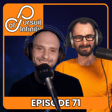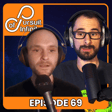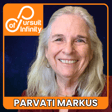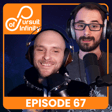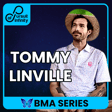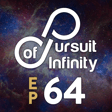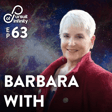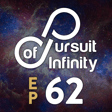Become a Creator today!Start creating today - Share your story with the world!
Start for free
00:00:00
00:00:01

6. Drugs, Education, and Consciousness
In this episode, we riff on a variety of topics surrounding drugs, education, and consciousness.
_________________
Music By Nathan Willis RIP
Follow Pursuit Of Infinity:
www.PursuitOfInfinity.com
Discord: https://discord.io/pursuitofinfinity
YouTube: https://www.youtube.com/channel/UCPpwtLPMH5bjBTPMHSlYnwQ
Spotify: https://open.spotify.com/show/58he621hhQ7RkajcmFNffb
Apple Podcasts: https://podcasts.apple.com/ca/podcast/pursuit-of-infinity/id1605998093
Instagram: https://www.instagram.com/pursuitofinfinitypod/
Patreon: Patreon.com/PursuitOfInfinity
Transcript
Introduction and Support
00:00:00
Speaker
Welcome and thank you for tuning your metaphysical antenna into the conversational vessel. That is the pursuit of infinity podcast. I'm Josh. My co-host is Joe. And today we have a far outflow of esoteric observations that I hope you find enriching.
00:00:15
Speaker
But before we get to it, if you'd like to support the show, the easiest way to do that is to give us a five star rating on your platform of choice, as this helps us to keep the lights on and to get bigger and better guests for bigger and better conversations. You can also visit our Patreon at patreon.com slash pursuit of infinity. We're on Instagram at pursuit of infinity pod. So give us a follow there and keep up with all of our musings. And with that, I hope you enjoy today's discussion.
Understanding 'Drugs'
00:01:10
Speaker
I think it's crazy. The term drugs in general, like the word drugs. Like it's such a nothing word. Like it encompasses like anything from coffee to DMT to tobacco. Like that's such a word that just encompasses way too much. You say something's a drug. I mean, when you do like a psychedelic, is it, is that a drug? You know what I mean? What is that?
00:01:38
Speaker
Well, you could drive down the street and see like a sign on a store that says drug store. You said like the, um, the Carlin bit where he says like, uh, you drive down the road and you see a sign and just as drugs, you know, like real big, but that.
00:01:55
Speaker
mean something different than if you say that somebody you know, is addicted to drugs. Like the we use the same word for two different things or for a multitude of different things.
Government Regulation Debate
00:02:09
Speaker
Yeah, well, exactly. Because like think about almost everyone you know is addicted to a drug, something.
00:02:15
Speaker
You know, like caffeine, that's like almost everybody, you know, probably addicted to caffeine. Caffeine, nicotine. It casts this umbrella to then determine something to be illegal. That's how it's used. Yeah. It's used to like, it seems like it's, it's used, the word is used to deem something like able to be regulated by your government because you as an individual and as a collective aren't
00:02:44
Speaker
responsible enough to use it correctly or something like that. Therefore, you shouldn't use it at all. Because the government is daddy and daddy has to tell us what we can and can't do. Which is why I understand the perspective of bigger government because you want regulation on certain things.
00:03:04
Speaker
Government can overreach dramatically when given the opportunity. And when it does overreach successfully, those things stay in place. Like you don't, they don't take away their own right to control. They just take more rights from the individual as government gets bigger and bigger.
00:03:25
Speaker
That's why big government is bullshit. To a point, it's a little bit of this and a little bit of that. For some things, I think there needs to be intense government regulation because there's a lot of stuff that we don't involve ourselves with on the day to day. Like when it comes to Wall Street and stock markets and the way that things move.
00:03:49
Speaker
Logistically, we don't really have a stake or any kind of knowledge in that. So in terms of that, I think you do need some government outreach to make sure that these things are regulated and done correctly. But when it comes to individual human rights and like what we're allowed to do and not allowed to do, that's where the line needs to be drawn, I think.
00:04:08
Speaker
Well, yeah, you give them an inch, they take a mile. That's what they do. And they keep that mile. They never give that
Legalization of Drugs
00:04:13
Speaker
mile back. The crazy thing is, I mean, it kind of just goes in the face of what I just said is the fact that now they're starting to legalize weed everywhere, basically. It's something you think once they had that, they weren't going to give it up.
00:04:27
Speaker
But you know how they're starting to legalize weed and what Oregon has? Pretty much everything is legal in Oregon, right? You can do like heroin out there. It's insane. Well, I think they're, they're in a transitional process right now. Um, like for instance, one thing that they're doing is they're, they're instituting this, uh,
00:04:48
Speaker
this program for training people to facilitate psilocybin mushroom ceremonies. And you don't have to have any sort of formal education, you don't have to have a degree, you can just be some random Joe Schmo from the street and go into the certificate program, take it and then you're able to facilitate these these experiences, which I think is really cool. It is cool. I mean,
00:05:13
Speaker
Should you have to do anything in order to, you know, I mean, should you have to, they have to take like a class or a course or, and then what you get a certificate. Yeah, basically, which says like, you're allowed to legally do this as like a, maybe not like as a practitioner necessarily, but yeah, as like a practitioner, you're, you're able to facilitate these experiences for people. And I think that's very cool because it gives like the, the regular person the opportunity because man, you shouldn't,
00:05:44
Speaker
I want to be careful how I say this because I understand the medical method of making drugs legal. Cannabis started off with a medical model. And then when they realized that they could start to make a lot of profit from cannabis, that's when you see, um, like the recreational, um, laws changing. So if psychedelics can take the same route.
00:06:14
Speaker
It seems like they're more effective for more ailments medically. And hopefully that leads to like a recreational type of a law change.
00:06:27
Speaker
Yeah, it's like Adelex is weird because they go so far beyond recreational. I got a question for you anyways. So do you think that all drugs should be legal? Yeah, I do all drugs. I think all drugs should be legal and regulated because for a few reasons.
00:06:46
Speaker
Two main reasons, number one, because if you want to control crime, you control drugs. Drugs are, have been intertwined with the problems that we have in our cities, especially forever. It's always been about drugs and you know, people.
00:07:09
Speaker
Like the need for a cartel only exists when you can't go down to the corner store and buy your drugs. And also with it's a, it's another positive part of, of regulation by the government, because you would be able to get something that, you know, exactly what's in it. You're not going to get anything that's cut. Um, cause the dangers.
00:07:35
Speaker
of drug use usually come from, um, impure substances or, uh, like dosage disparities. Yeah, that's true. Could you think or make a case for one drug you would think that shouldn't be, or cause I know you just said all of them, but I'm trying to think then what was just the argument to make a drug illegal?
Empathy and Drug Laws
00:08:00
Speaker
I mean, I think they use the guise of empathy, like they care and like, oh, we don't want people destroying their lives, this and that. But I think it's pretty much safe to say that making something illegal doesn't stop anybody from doing it. I think it destroys more lives because you're throwing people in cages for things that they shouldn't be thrown in a fucking cage for.
00:08:24
Speaker
Yeah, probably like in the future, it's going to be looked at, like completely barbaric to put somebody in a cage for
00:08:32
Speaker
You know, even if just for doing a drug like a nonviolent offender, just like taking drugs is enough to get like, I mean, look at it now. Like now they're starting to release people, but there are people in prison for smoking weed, not selling weed, not, you know, just smoking weed. And that's like crazy. But, you know, 10 years ago, that wasn't that crazy to think about.
00:08:56
Speaker
Yeah. Yeah. And I mean, it is good because. Friends are going in a positive direction, but man, did you imagine being fucking locked up just for smoking a blunt? I could not imagine for like, yo, they used to lock people up for like 70 years. If you got caught with a joint, it's fucking crazy. I think Tim Leary had like.
00:09:17
Speaker
a little over an ounce of weed in his house they busted in his house in the middle of the night and they took him away and they sentenced him to five years in prison it's just it's crazy man and see the thing is we like when you talk about weed that way it sounds ridiculous but then if you say like oh they busted in someone's house and found a kilo of coke or like
00:09:37
Speaker
bundles of heroin everywhere. It seems a little more reasonable, but is it? You know what I mean? Is it really that much more reasonable to be locked in a cage for that? Well, think about this. If you have a kilo of Coke on you, you know, they're not going to get you for personal use. They're going to get you for intent to sell. Sure. And the only reason
00:09:56
Speaker
For anyone to sell drugs is that you can't get it anywhere else. You know, if you, if you can't get something from a store, you go elsewhere for it. That's just how it is. And humans will seek out and obtain any drugs that they want. Cause that's what we do. It's what we've always done. We're a drug using species species. It's crazy how.
Critique of Drug Education Programs
00:10:20
Speaker
how vital drugs are to culture and people. It's a huge part of what we are as a species. And then it's basically, I don't know if it was McKenna that says this, a lot of people say it though, it's crazy that the government makes laws on just altering consciousness. If you don't look at the substance as the problem, what we're doing
00:10:44
Speaker
is using stuff to alter our consciousness. So we don't have control over our own consciousness, which is crazy. It is crazy. But I think a very important piece of this is, you know, you can't just one day legalize everything, and then expect that your society isn't going to have a transitional period with the degree of education that we currently have about drugs. Like think about, like when I was in middle school, we had
00:11:14
Speaker
We had to go through the DARE program, which is the exact opposite of drug education.
Personal Experiences with Drugs
00:11:20
Speaker
Just say no. Just say no. Just stay away. It's insane. That's unrealistic. There's no way.
00:11:29
Speaker
People are going to naturally be curious. I mean, I feel like every person I've ever met has at least tried maybe a drug or two. I mean, alcohol is usually the common one in weed, but everybody goes through life, at least with the curiosity. It's kind of strange when you meet somebody who'd never tried a drug or never even had, like, you can talk to some people and they never had the desire to. Personally, I just, it's hard for me to understand that.
00:11:57
Speaker
Well, I mean, it, there's a lot of fear involved with these programs like DARE and they work. Like I know people who have never had the desire to do a drug ever and they never have done a drug. And that's because the fear was put in them early and it was put into them effectively. That's strange, like how it works so effectively for some people and others. They're just like, that's complete bullshit. I want to go do this now. Like you tell a lot of people not to do something. It makes them want to do it more.
00:12:26
Speaker
Yeah, some people for sure. Yeah, they definitely have that. But the thing is, once you smoke weed for the first time or something, I smoked weed for the first time and it was almost like a psychedelic. It blew my mind. Imagine, because when you're young, you've never experienced a change of consciousness. I smoked weed and I was like, blew my whole world open. I was like, what the fuck was that? It was almost like a psychedelic experience.
00:12:52
Speaker
And, you know, when you, if a kid has that experience, it's going to change them. So it's pretty nuts. And it is, it's psychedelic in nature. Like it's not as potent, like, or it's not as like consciousness lasting as like a regular, like traditional psychedelic, but it is psychedelic.
00:13:12
Speaker
But dude, the first time I smoked, it was pretty like I was, I was in a circle and, uh, and, uh, like back in the woods, just in a circle with this like crazy homemade gravity bond. I was like, all right, fuck it. We're gonna, I'm going to smoke it. And I smoked it and it's weird. I didn't get the effect. Like now, if I smoke.
00:13:32
Speaker
The effect comes gradually. Like while you smoke, like it's happening. I smoked like three hits, four hits or something out of this bong and nothing happened. But then like five minutes later, it smacked me in the face. And like it was completely different than what it's like for me to smoke now. It was like truly psychedelic and like crazy, like burst of laughter. It was just insane. It was way different than once, you know, you start to get used to it.
00:13:59
Speaker
In terms of tolerance, not everyone is created equal. You know, some people, you know, you wouldn't want like a 16 year old or 17 year old who like just got their license to, who's never smoked weed before to take a few hits of a joint or something and go drive. But someone who has a high tolerance to it and like say smokes every day or has like a medical card and like uses it every day, that person may not, or might not
00:14:30
Speaker
Or maybe shouldn't have to adhere to the same exact rules as everybody else. And I think that's where the knowledge comes in because we, there needs to be a certain point in time where we stop looking to rules, governments, and regulations to tell us how to use drugs.
Harm Reduction and Education
00:14:47
Speaker
We need to be able to make those decisions for ourselves. Like we were talking about earlier today, actually. But drugs, dosage is everything. And if you know your dose.
00:14:59
Speaker
That's everything I when I when I had when I was taking the. The navigating psychedelics for clinicians and therapists course. Through psychedelics today. One of the one of the founders and instructors, Kyle Buller.
00:15:19
Speaker
Had told a story where he was somewhere, I forget where he was. He was with like a group of like psychedelically minded people and they were at some sort of conference or event of some sort where they were all like working together and he didn't name who the person was.
00:15:36
Speaker
But he said he was outside like sharing a cigarette with someone, I believe it was a female. And he said, you know, they were just kind of passing the cigarette back and forth. And after a few hits, he went to pass it back to her. And she said, No, that's okay. That's my dose. And, and he was like, Oh, like, that's interesting. And that really is an interesting way to think about
00:15:57
Speaker
all substances that you take into your body, whether it be caffeine, drugs, you know, tobacco, nicotine, whatever. Like it's an interesting thing to think about what's my dose or all substances that alter my, my physiology.
00:16:11
Speaker
Yeah. And that's where making all drugs legal would be brilliant. Because the thing is, if you pick a drug, if you use that drug, if it's an illegal drug, the quality varies so much on the street. You don't know what you're getting, like how pure it is. So like you don't know your dose. Like for instance, if you're a heroin user, you could think, oh, my dose is three bags because I've been getting this heroin. And then you could get something that is pure and then it kills you.
00:16:38
Speaker
You know what I mean? Like there's no way to know what dose is the actual dose that you're getting. You kind of have to wing it, which is really sketchy. And like you look at all the opioid deaths, it's, I don't know, it's crazy. But if they just legalized it and let people know what they have, like how strong it is or whatever, it would be common knowledge to be like, okay, if anybody can do one bag and not die, anybody.
00:17:04
Speaker
Whereas on the street, there's some, you know, shit where you could do a little bit and it'll kill somebody who's never had it before. So like, if there was like a way, like, I mean, they do it with, you know, like pills, these opioid pills, like if they just legalize all drugs and then actually really educated people on the doses, you would just minimize like fatalities from drugs, like altogether.
00:17:29
Speaker
Not to mention initiatives to provide drug users with clean needles and clean administration because that's a big problem too. And I know there's a lot of cities that are doing that. They're starting to have centers pop up where you can go and get clean needles. I think there's even places where you can go and a doctor will shoot you up, essentially, so you can safely do your drug.
00:18:00
Speaker
But what I was just thinking was how amazing it would be if as a culture, if we had some type of psychedelic initiation, like if it was normal for like, let's say when you turn 16 and have a psychedelic experience, like and do it in a way.
00:18:21
Speaker
Like, uh, I don't know, like certain cultures did that, that kind of thing. Like even with kids, which I don't know, I would say you should probably
Cultural and Spiritual Perspectives on Drugs
00:18:28
Speaker
be like 16, maybe 18. I don't know. Because it depends on your maturity level and within each culture they have different maturity levels. And then I guess when they, they consider you, um, turning into like, um, like becoming a man, that's when like the, the rite of passage would be. Yeah. That's what I mean. Like.
00:18:48
Speaker
a rite of passage exactly some form of that because there's no there is none of that in our culture there's not really a thing like the closest thing would be like driving a car which is like not very spiritually gratifying or doesn't really you know it gives you freedoms and all that which is great but there needs to be something to introduce the sacred back into our culture as a whole because we're fucking dying man
00:19:15
Speaker
We're dying here. It's just so, it's, it's so cluttered with, uh, with like materialistic, you know,
Education System Failures and Reforms
00:19:23
Speaker
values. Well, think about schooling in general. Like when you go to school, you're not taught how to think. You're not taught how to be a fully formed human. You're not even taught like.
00:19:33
Speaker
The whole basis of school is to prepare you for life, but you're not taught how to even calculate the percentage of taxes that should be taken out of your paycheck. You get no education in the reality of the real world. What you get is how to be obedient, how to listen, really how to be a factory worker in the 1860s.
00:19:58
Speaker
that's exactly true. And that's what our school system is based on. It's based on, you know, to be able to work in a factory. And that's kind of, I don't know, it's just insane because now, I mean, you don't really need 12 years of school, just like I could have skipped school altogether and worked in a factory just fine. So it's just like you memorize. I mean, once you learn to read and write,
00:20:24
Speaker
I don't know what's the point after that. I don't know. I mean, I really, I do believe that like, you know, you need a solid foundation of math, of, you know, science, English. Like I do think that these things are important, but the problem usually is the way that they're taught. It's the curriculum itself, really. I mean.
00:20:49
Speaker
You could, you could effectively teach people the things that they need to be fully formed humans without giving them like curriculum based solely off of multiple choice standardized tests because your school needs funding. Like that is a system that is not conducive to truly educated people. No, I mean, I don't know. The school system is in my opinion.
00:21:20
Speaker
I just, I don't really think it's effective at all. I think, like I said, once you, and especially now with the internet, once you learn to read and write and you can do math, like you're pretty much open to learn whatever you want after that point. Like instead of being forced to learn about stuff that you're going to just memorize and forget.
00:21:39
Speaker
I don't know, maybe they should have like more specialized schools for people who are interested in certain things rather than cramming everybody together and just kind of tossing them into one classroom and then just memorize and then, then forget it in a year. Now with the internet, like if we had a system that gave you the internet and then taught you
00:22:05
Speaker
how to disseminate information and taught you basically how to use the internet in a way that's going to fulfill your own educational needs. And what that means to me is teaching people the value of knowledge. I think that's the number one thing that was diff that's the difference between like learning.
00:22:27
Speaker
And like schooling, because I didn't learn shit in school. I didn't learn anything. You know, I, I did what I had to do. I never did my homework and I just, I barely passed tests, you know, and I got my diploma. I didn't start to actually learn until I realized later in life, how fulfilling and how amazing and how much I enjoy learning.
00:22:54
Speaker
And if you can get kids to understand and to see that when they're young, then they have their whole lives to learn and to learn joyfully. But we don't learn joyfully. We're forced to memorize shit that we don't care about and that we're never going to use. It's crazy because as kids, we're taught to hate learning basically, which the truth of the matter is that
00:23:21
Speaker
No matter who you are, you love to learn as long as you're learning something you're interested in. But same as you, until I was out of school, I thought I hated learning. It's because my whole experience of learning was just cramming bullshit into my head. And none of it, I never really used any of it. Other than, you know, I mean, just reading, reading and, you know, math and that basic stuff. I mean, you use that obviously, and it's super important.
00:23:49
Speaker
But all the stuff on top of it is just, I mean, I guess history is really important too. History needs to be taught. But what history should be taught because as you know.
Profit Motives and Substance Legalization
00:24:04
Speaker
The history that we're taught is from the perspective of a certain control mechanism. And I mean, look no further than say, Graham Hancock and his work with ancient civilizations for years, since the nineties, this dude has been chastised and called a pseudoscientist.
00:24:26
Speaker
Even though he doesn't claim to be a scientist at all. Um, and now he's becoming validated. And right there it goes to show like it's really hard to break through the structures that are currently in place.
00:24:40
Speaker
You know, because really this is the problem with the drugs. It's the problem with our education because it's all the systems are all rooted in profit and making money. Capitalism, baby. And that's why you see these, some of these drugs starting to become legalized now, like psychedelics and cannabis, because they're finally realizing how much money can be made. It's a profit
Ancient Civilizations and Historical Misconceptions
00:25:02
Speaker
motive. If you go on to like.
00:25:04
Speaker
your E-trade account or, you know, whatever, and you look up some of these like psychedelic stocks, there's a lot of money and millions of dollars going into these stocks. So that's how you can tell you just follow the money and you'll be able to tell where the trajectory of these things is going.
00:25:20
Speaker
Yeah, you brought up Graham Hancock and it's awesome. The time we're living in right now because in real time, the human history is unraveling. It's amazing. We're talking about school. Growing up in school, we were taught a little bit. We had period that we were taught about ancient Egypt and all this.
00:25:42
Speaker
And we were taught about this stuff as if it was fact, like, all right, well, the pyramids were tombs and they were built by slaves, this and that. And it's like, okay, we know all this. We know about our past. So then it turns out in real time, all that stuff is getting debunked. And like, we really don't know 97% of human history. It's really wild to think about. Like, we don't know. We, like Graham Hancock said, uh,
00:26:08
Speaker
where a species with amnesia. It's crazy because when you think about it, we don't know anything like clearly up until a couple hundred years. Really wild.
00:26:21
Speaker
Yeah. You know, we're a species with amnesia that is fueled by our hubris because we think we know, we think we know everything. We think we know all through history. We think we know that Atlantis was not real. You know, that's another one that that's interesting. Like, I mean, it might sound like sort of woo woo to even talk about the word Atlantis. But when you think about the law civilizations, like there's so much evidence for massive amounts of.
00:26:50
Speaker
Meteor and common impacts. I mean, we don't need to get too much into the impact theories, but there's just so much that goes against what the mainstream like archeology community is willing to accept because man, they got to get those grants. You know, they really want to get those papers published in science and in nature. So, but it's, it's wild. Like some of the smartest people in history, like we're writing about Atlantis. Like, so I think about that and it's like.
00:27:21
Speaker
It's like when we think to people of the past, we assume they were stupid for some reason. So it's like, oh, they were writing about Atlantis, like, but clearly we know that's not, that's not real. It's like, why would they put so much time into, you know, writing this stuff down? I don't know. I think there's a lot of evidence that
00:27:40
Speaker
points to like the civilizations being real. It's that hubris, man. Like we think that we know everything and we think that because we are smarter
Cosmic Events and Human History
00:27:50
Speaker
in some ways than our parents and our parents are smarter in some ways than their parents and that with generations come progress.
00:28:00
Speaker
We think that that can, we can extrapolate that idea to thousands of years and it just doesn't work that way. No, especially when you're talking about a possible like, you know, civilization ending event, you know, I mean, forget what it was, but there, there was some event that happened, you know, thousands of years ago that.
00:28:24
Speaker
It ended with, like, the human civilization being knocked down to, like, 5,000 people or something. I think that was the Younger Dryas impact. Was that the Younger Dryas? I think so. Because I know I've heard that. I don't know too much about it. But just imagine, like, the scariest thing is to realize that that could happen at any time. Like, this planet could get hit by a rock. The planet don't give a shit, but people will be wiped off, and then you'll be left. Like, it won't kill all of us. There'll be still people left, and it'll take another
00:28:53
Speaker
you know, 10,000 years just to build the population up a little bit. Did you, did you happen to finish the Randall Carlson Rogan podcast that was just dropped? Yeah. You hear when he was going through all of the news stories of, of like the past few months of all of the near misses. Yeah. Near misses. It's, it's terrifying. That's, it's just outrageous. And then it makes you think too, like if let's say.
00:29:21
Speaker
If somebody out there knew that one of these was coming, would they do everything in their power to, you know, keep that a secret from us? Or do you think that it would be, you know, they would just tell everybody? I don't know. I don't think that if it, I don't think we may not have the technology. We definitely don't have the technology. It doesn't seem like to deflect something like that, like depending on the size of it, but we may not, we may not even have the technology to see it coming.
00:29:50
Speaker
Well, I didn't Randall Carlson say that we do have the technology, just not the funding or like basically like problem. That's what I mean. Like theoretically, theoretically, we could deflect the comet.
00:30:03
Speaker
But we're not preparing for something like that. So we're technically, we couldn't because we're not prepared for it. I guess you'd say. I feel like that goes for like everything we could do.
Technology and Global Issues
00:30:13
Speaker
Humans are so amazing in our technology. We could, and if we decided to as a global civilization that we wanted to.
00:30:21
Speaker
End all suffering and we wanted to become completely symbiotic with the earth and reduce our carbon footprints to zero we could do that in six months we could well here this is technology to do anything that we want we just don't have the ability to apply it to things that make a real difference but now that's interesting because now i'm thinking.
00:30:44
Speaker
I don't think we could end human suffering. I think I think that's just a part of what. All right. That may have been a romantic idea. No, I know what you mean, but that's just.
00:30:56
Speaker
I don't know. It's part of the human experience. It has to be. Well, let's say we could end the human suffering that goes with dropping bombs on each other and like an inflicting violence on one another. Even that dude, do you think that? All right. Well, at least maybe this is a cool topic. Do you think that world peace is possible? I think that. Yeah.
00:31:20
Speaker
Yeah, I don't see why not. Well, I'll tell you why not. All right. Well, just because it's never happened before. I mean, if you look at all of human history, all it is, is little, little tiny spaces of time in between just like murderous wars. I honestly, I beg to differ. I think there was a golden period of time when human beings were symbiotic with nature in our environment.
00:31:49
Speaker
Uh, probably in our adolescents, like human adolescents. And I think that what started the.
00:31:57
Speaker
Downward, well, maybe not be downward, but the spiral into materialism was the introduction of farming because when you, when you're like a nomadic culture and you're moving around from place to place, you don't have this notion of like, this is mine and this is yours. Like, you know, you get off my lawn. So when you have a farm though, and you put like, you realize and you discover that you can plant crops and you can feed your family.
00:32:27
Speaker
When you start to become more, more sedentary as a lifestyle, you have, you claim ownership over like your property, say, like, you know, like I'm going to settle here and this is my property. You settle over there and that's your property. And then we start to claim ownership over things. And that's where like quarrel begins. But when you're, when you're not in a position to do that, like to claim ownership over things.
Ownership, War, and Human Nature
00:32:54
Speaker
um, and to distinguish between, you know, people and tribes and things of that nature. I feel like there was a golden age of humans being symbiotic with the earth. And I think that's probably the definition of prosperity, right? In terms of like nature. Well, to go into that a little bit, well, you think back to when we first came to America, colonized America, we showed up and
00:33:21
Speaker
One of the things that started the war between the colonizers and the natives was the deal that they made over Manhattan. So the Americans, they bought Manhattan from the Native Americans. They gave them a bunch of pelts and ships full of stuff and said, okay, now we can have this land. But the Native Americans had no concept of property. So not long after that, they came back and wanted their land back.
00:33:52
Speaker
The Americans are like, no, we bought this. This is our property now. And see, they didn't understand the concept of property. So that's kind of like what you were saying, but they were still killing each other. The tribes are killing each other without the concept of property. You know what I mean?
00:34:09
Speaker
Yeah. I mean, I, I more so was like speaking on, um, like even before that, like when we're, we're still like, it's almost like the stone dape McKenna theory at the time that we were in that, that period of stone dape time. That's I think when the, that was the moment of the golden age of humans. Yeah. Well, maybe, I mean, I, I would, I would make a bet that people were always killing each other. But the thing is.
00:34:37
Speaker
My point was that basically, even if a culture doesn't have the concept of property, they're still killing each other. I think it's just in our nature to, I mean, think about it. There's never been a time where you could go somewhere on the earth and people are killing each other. And all animals do it, right? All animals are territorial. And it's not necessarily a bad thing. But I think it becomes a bad thing when
00:35:07
Speaker
You skip up millions of years or thousands of years to like the Iraq war. You know what I mean? That's bad for us, like, and our egos. But when you think of the universe as an intelligent mind, you got to figure the universe knows better than our egos.
00:35:29
Speaker
Well, I mean, I like to think of it as, um, like a disease, you know, just because like, if the earth is an intelligent mind and you're, or if the, well, if the universe or the earth is, is some sort of, cause like I tend to, to think along the lines that like the earth is some sort of like, um, unified organism.
00:35:50
Speaker
And if there's unified organism with some cells on it that are not performing the tasks that they are supposed to perform and they're sort of disease may be turning to cancer turning to some autoimmune disease you know that could be.
00:36:05
Speaker
Translated to what we're doing, you know, just because it happens and just because violence is in our nature doesn't mean that it should be happening to the degree that it is happening and with the motivations that we carry it out with because that to me is a hindrance on like the guy in mind or whatever you want to call it.
00:36:30
Speaker
Yeah, I mean, I still think that I don't know if you look at the universe as an infinite intellect and it is supremely intelligent. Everything that's kind of the way I think that everything happens for a reason or everything that's happening is happening the only way it could and exactly how it should happen. It's like if you take yourself out of the ego and just kind of
00:36:54
Speaker
realize that it might be in better hands than you could, you know, cause if you think about it, you'd be like, Oh, I could make the world a much better place if people just listened and you know, we stopped the war and this and that, but that assumes that the universe isn't already in a higher position of intelligence than you. So maybe, you know, all this stuff that we consider bad is just relative to us and it could be part of a greater plan that the universe has that, you know, we just don't see through our ego mind.
00:37:23
Speaker
Seems to me to be a little bit of both. I think that. Well, there's definitely, I agree with you too. There's definitely both there, but in the grand scheme of things, I believe that everything is happening perfectly. And the improvements that you're talking about probably should happen. And we believe that and they probably will, or hopefully they will, but it could get a lot worse. I mean, I believe that.
00:37:48
Speaker
Things are not as in our control as we'd like them to be. I mean, like we were just saying, dude, a comet could hit the planet in a week and all of these problems we're talking about are completely gone. So that's to say that, do you think that if we were obliterated from, say our physical forms were obliterated from this physical reality?
Consciousness and Reality
00:38:15
Speaker
Do you think that all the things that we did mean nothing?
00:38:21
Speaker
I mean kind of. Like they have no impact? Well kind of. The way I put it is that there's no such thing as good or bad. Everything is exactly perfect how it is always and that's like an insight that I've gotten from psychedelics that you know everything you think is good or bad is really just your ego mind judging you know an already infinite intellect.
00:38:45
Speaker
So I believe that everything happens is perfect, and all of our suffering doesn't actually happen to what you'd call the true self, that only the ego suffers. So the formless, the true self, the infinite intellect, God, whatever is absolute perfection, and it is everything, and it's always happening, and there is no suffering. It's only the ego that suffers. So if you believe that consciousness is primary,
00:39:14
Speaker
Do you also believe you want to explain that just a tiny bit? Uh, well, yeah. Okay. So consciousness being primary would, would be like a panpsychist view. Um, where, um, the materials, the materialist view is that the brain creates consciousness within itself, depending on which neurons are firing when, and each, um, chemical interaction that's happening within the brain panpsychism or consciousness being primary is more like.
00:39:42
Speaker
The easy way to understand it is like the brain is like a TV and the broadcast is consciousness and the TV is sort of tuning into it. I don't have a panpsychist view because my view is that like consciousness is fundamental over matter and see that couldn't be true if the brain is tuning into consciousness.
00:40:06
Speaker
that would assume that you need a matter brain to tune in to this thing called consciousness. Let me ask you a question. Why does one have to be fundamental over the other? Why? Because to me, it's, you know, I always look at things as a this and that not as things as a this and then that or like one thing is bigger than the other in these realms. To me, it's both. It's both are equal. Well, because
00:40:31
Speaker
That's why I said I didn't want to talk about this yet, because I want to be able to lay out my argument. Because then I have to debunk the other argument, which I can't do right now. Yeah, I understand. But I have to have my shit laid out. But it has to be that way is my point. My initial question when I brought up consciousness being primary was, if you think that consciousness is primary, then wouldn't that mean that the things that we do
00:41:01
Speaker
while we're bodies in, you know, inhabiting consciousness, you know, um, observing itself or however you want to look at it. Doesn't that mean that the things that we do have some sort of an impact or an importance to consciousness in itself, which would sort of, uh, debunk the thought that if we were all obliterated in an instant, that all the things that we've ever done and all the things that we've ever been have no effect or have no meaning.
00:41:29
Speaker
Well, see, that's the thing when you first, like, let me go back a little bit to what I was saying that that because you were saying that the brain tunes into consciousness.
Quantum Entanglement and Meaning of Actions
00:41:39
Speaker
Well, that that's one way of looking at consciousness being primary. But that's what I'm saying. I'm saying not at all. I'm saying that the brain is just it's not actually like consciousness is is actually all that there is.
00:41:54
Speaker
And the brain is really just concept. It's not truth. It's not, it's just the concept that you're thinking of right now. The only thing that is true is this moment right now. The eternal now is everything. And this stuff isn't really matter. That's just concept that we create to understand what's happening or to kind of create this, this narrative that we have like, okay, like you'll get your hand like, okay, I know that this is built of atoms.
00:42:21
Speaker
But is it or is Adam something we created just to try to understand what's happening in this moment? Just because we create
00:42:29
Speaker
or construct the word atom and we write out a definition for it and teach people what that definition is, doesn't mean that the atom itself or the thing that we're observing isn't real. I think that's the problem with what you're looking at. It's real as a concept, but it's not truth. You're not actually made of atoms because there's also the entanglement problem that physics proved.
00:42:53
Speaker
that these things don't exist without quantum entanglement. You need an instrument to entangle with in order to create the thing. It doesn't exist without the mechanism or without the tool you're using to view it or whatever. It doesn't even exist. So that's proven. By doesn't exist, what do you mean?
00:43:12
Speaker
I think it's funny that we just said we weren't going to get into this and now we're getting into it. Because quantum entanglement is why because it was proved to you. This is why I wanted to have notes and stuff so I could lay it out properly. But what it proved was that like a particle or whatever doesn't exist basically without the instrument you're using to view it. It doesn't even exist. So
00:43:38
Speaker
It's literally not real unless you're using the instrument that entangles yourself with it. We're going to have an episode that goes over all of this and we're going to, we're going to get really deep into it. But my, my essential question was based off of what you said earlier, which was that if we didn't, like if we were obliterated from the planet, then everything that we've done means nothing. And I think that's not true because, um, when, so it's sort of like.
00:44:09
Speaker
What we do, who we are, the love that we give the, you know, whatever, however you want to gauge our purpose on this planet, I think it directly feeds back into the consciousness of the species at large, sort of like a Rupert Sheldrake's morphic resonance. So what that does is it gives us equal responsibility for our actions while still acknowledging that like.
00:44:40
Speaker
Our species consciousness is primary. So like that's, it's like we're feeding our intelligence, our knowledge, our emotions, our experiences back into the source of consciousness. That's the way that I sort of look at it.
Language, Non-Duality, and Reality
00:44:53
Speaker
And in, in that way, what we do in this life matters and it has some sort of an impact on the greater.
00:45:04
Speaker
I mean, see me personally, I don't really, I don't really have a belief into like necessarily like we have a purpose necessarily. I mean, I don't know.
00:45:16
Speaker
Yeah, for me, that's all seems like it's concept and imagination really. But see what is anything without concept and imagination. All we have is, you know, what our, what our minds can concoct, you know, even when we talk about like consciousness being primary or, you know, every single thing that comes out of our mouth.
00:45:37
Speaker
is concept and where what we're doing is we're replacing language on the world and we're defining things as language no matter what you do. Well, that's what I'm saying. All language isn't going to work either. It just doesn't work because language is constructed out of dualities. Language isn't, its purpose isn't to discuss or know the truth. That's not the purpose of language. Language is a survival tool.
00:46:01
Speaker
So all the language you could use is built of dualities, and my main point is there are no dualities. So there's no way for language to really accurately
00:46:11
Speaker
accurately articulate the truth. But when you look at it from a non-dual perspective, all dualities collapse. So everything that we're talking about is really just concept and imagination. The non-dual perspective would say that really all that exists is
00:46:32
Speaker
Yourself and that's all there actually is and the thing is if you reach That state that you can do it with psychedelics. You can come to a realization of Really only one thing existing which is you and it's just love that's basically like a shitty version of non-dual the way I look at non-dual so you said that non-duality
00:46:57
Speaker
Um, it collapses dualism. And again, we're going to have an episode about this too, because I think we really need to, but what I do want to say is that I think what, I think a better way to look at it is non-duality cements duality as form. It's like, right. And non-duality is formless. Yeah. Yes. But you can't have the formless without the form here. Let me, let me explain.
00:47:24
Speaker
consciousness let me try to use an analogy for consciousness so and this is basically what you are so imagine a ball of clay on a ball of clay you can make infinite shapes with so you can you know mold it however you want and you know build literally anything with this clay so that's basically what consciousness is
00:47:52
Speaker
But imagine the clay not being made of matter, not having a color to it. So it's basically, it's emptiness that can be formed into anything. So where does our yearning for purpose and meaning come from? From our egos.
00:48:10
Speaker
So do you think it's misplaced and we shouldn't yearn for a purpose? I don't think it's misplaced or anything like that. I just think that it's part of the game that we're playing. I mean, I just don't think that there's any way to really prove that it's concrete and real. It's just concept and imagination. It's things that we're placing on top of reality. It's not actually integral to reality. Do you think that really matters? Do you think it matters if it's real?
00:48:36
Speaker
Or like, honestly, it's like, what is real? Then what's the definition of real? Is it? Your hand is real.
00:48:45
Speaker
just the hand, not the word hand, not all the stuff that you place on top of it. That's like one of the meditations I'll do is just look at the hand and pull away everything you know about it. You just pull away what it's yours. It's not your hand. It's not made of atoms. You pull away all the concept and imagination that you place on top of this. And then what you're left with is truth. What you're left with when you're looking at it is just thing itself.
00:49:11
Speaker
Nothing attached to it. And that's what's true. All the other stuff you think when you're looking at it is concept and imagination. So what that is, is that is a method of coming to truth or a method of coming to non-duality.
Perceiving Truth and Meditation Practices
00:49:28
Speaker
Yeah, it's just a meditation. Yeah, but see the method itself, I think there's a distinction that has to be made between the method and the truth itself because
00:49:41
Speaker
The method is to deconstruct your hand. Sure. Like that, that is a method, but that doesn't necessarily discount the reality of the physical hand. You know what I mean? Those two things must exist as form and formless simultaneously to exist as, as anything like to exist as a non dual state.
00:50:03
Speaker
All you're doing is just seeing it for what it is rather than all your ego ideas and everything that you place on it. So it's not changing anything. It's just recontextualizing what you're looking at and to see it for what it is rather than, you know, all the attachments that you place on top of it. Yeah. It's like incorporating both sides, you know, the material and the non-material into like one, like full frame of reference, right?
00:50:30
Speaker
Seems like it's just an exercise to kinda get you to thinking around those lines because the thing is what we're we're rational minded and like rationality is a great tool for survival and to innovate and all this stuff but the thing is.
00:50:46
Speaker
In order to get to a non-dual state or to try to see things in a different way, it's impossible because it's not in our nature, but you have to not question the process. You just got to get rid of your rational mind for a while. The thing is, you're like, no, my rational mind doesn't want me to do that. We have to think rationally.
00:51:09
Speaker
I have to use my mind and ideas, but the whole point is to just trust the process and throw that shit out and do it anyway. And then you can come to a realization with, but you have to throw out all rational thought. Like you have to get rid of it and you have to practice it a lot in order to, and it's like, it's, it's almost impossible, but you can do it with enough practice, but there's always going to be a rational thought to, to debunk it or rationalize your way out of it, but it doesn't change what's actually there.
00:51:38
Speaker
I mean, I, I keep coming back to the non-physical being informed by the physical and the physical being being informed by the non-physical, like it's a, it's like a unity, you know, the unity of duality. That's the thing. That's like an imagined duality though. But if it's.
00:51:54
Speaker
To say it's an imagined duality is, is this like you're, you're still putting that this is the problem with language. It's like, no matter what you say, even if you say that it's a non duality, it's like, you're still putting this, this concept on it. That's why we can't put a finger on what reality is because we're trying to use language to describe because we don't have any other means of communicating to one another about it.
00:52:22
Speaker
Well, that's why I'm saying like the only way to really
00:52:25
Speaker
know it is by experiencing it and getting rid of you have to get rid of all your objections and all your rational thought that tells you that it's stupid and it doesn't make sense and of course there's physical and non-physical like of course that's real but you just you have to throw that out anyway in order to understand the full scope of reality yep yeah it's it's but that's why i think one of the best exercises is the hand just staring at your hand and then by by the time you're done and you might be looking at it for an hour
00:52:55
Speaker
you're not looking at your hand anymore. Quite literally, you're not looking at your hand. It's not what it is because that's just the stuff that you think you're putting on top of it. Like what we're looking at right now, we have so much concept and ideas that we put on top of everything, but this is just our perception right now. It's not exactly what the truth is behind everything.
Purpose, Spiritual Experiences, and Love
00:53:19
Speaker
Yeah, absolutely. And do you think that
00:53:25
Speaker
So when we grow up, when we start off in this world as little babies and we look at the world around us and we're just filled with wonder and we don't have any descriptions for what we're seeing. We don't say that's a tree and that's a door and that's a person. Like we, we just, it's just full sensory input without the label of language on.
00:53:50
Speaker
objects? Do you think that that's a more pure way of thought than when like children like if you start to tell your child, okay, that over there, that's a squirrel. Do you think that labeling something as a as a word removes the mystery and the wonder of that thing? I don't know. I don't, I don't think so. I kind of see what you're saying in a sense you think it kind of does.
00:54:18
Speaker
But it's hard to say that. Because as a child, you might be closer to some type of truth that you're unaware of. But the thing is, the way I look at it is that everything has to be this way. And you have to just... I don't know. I don't think there's any answer to that. I think you just have to do the work to understand it. I don't know. I don't really know.
00:54:46
Speaker
fundamentally you believe, do you believe that life has purpose or that there is like an ultimate purpose that is true or you will find it to be like a subjective thing that you create? My answer to that is my answer to like most things, which is both. I think it's a little bit of both. Um, I put there, I put a responsibility on the human to find and align themselves
00:55:15
Speaker
with the path of progress that is defined by like the larger capital P purpose, because
00:55:27
Speaker
Things don't organize in the way that life is organized without a purpose. Um, I think that is a materialist and sort of atheistic thought is that nothing matters. There's no purpose. There's no reason it all of this just is. And I do love the concept of isness, but I like that concept. And notice I'm saying I like, it's just, you know, opinion. Um, but I like that concept in like, in a way.
00:55:56
Speaker
but not in a way where it discounts purpose and meaning. Because again, when something like life sorts itself out in a way that we're seeing happen,
00:56:11
Speaker
in my view, there is definitely a purpose. And when I have been in the throes of my personal spiritual experiences, it has, I felt that it's not in, it's not a way that I can put into words. It wasn't like words were conveyed to me, but there is, there's a, there's a, a
00:56:34
Speaker
I had an experience once real quick. I want to tell this. Um, so I had an experience once where it felt as if I was being given the feeling that again, we are a species with amnesia and we have forgotten our role within the grand scheme of everything. And the grand scheme of everything is trying to communicate it.
00:56:59
Speaker
back to us to, to remind us what our role in this whole thing is. Um, that's the only way that I can put words to the feeling that I had, but it felt so real and it felt so perfect and so true that it has, it really has informed the way that I view this, this subject. So would like, I'm going to try to say it back to you maybe. Um, so would you say like the purpose could be
00:57:27
Speaker
almost just to align yourself with that frequency of like goodness like just to be aligned with that is that what you're saying kind of sort of yeah to be in alignment with that whatever that because i i have a similar view like when i had my uh that my one dnt experience where i experienced you know just this ultimate love and stuff i think the only thing
00:57:54
Speaker
like a purpose I could find out of that was just to align myself with that and and that would be kind of like an ultimate good I don't know and that means something that that right there that you just said that's the stats what I'm talking about
00:58:11
Speaker
You can feel that it's, it feels real. And again, you, you can't really put words onto it, but that is the general concept. Yeah. That there's, there's some trajectory of individual evolution.
00:58:32
Speaker
as deeply as possible. Like that's what my, the, the way, the way that I define, like, like if someone says like, what's the meaning of life? My answer to that, I got this from Duncan Trussell's mom. Um, she said something along the lines that the meaning of life is to evolve as deeply as possible from the day you're born to the day you die. And what that phrasing does is it allows for.
00:59:03
Speaker
any variety of things to mean evolving as deeply as possible. It depends on who you are, you know, your culture.
00:59:13
Speaker
your viewpoints, everything. It's very individualized. So I think that is a good way of saying, like aligning yourself with the thing that helps you to evolve as deeply as possible in a way that benefits like the capital P purpose, whatever that is. Right. So it'll be different for everybody. And different for each species. I think each, it's not just special to us. I think we do have, like we do have a,
00:59:38
Speaker
a vast difference in our potential and our like ceiling. I think our ceiling is way higher than any other species, but I do think that this applies to all life. So how do you, how do you answer that question? Like how, how do you feel? Like, do you, do you think that there, there's no purpose or there's no meaning? Like, do you agree with the way that I look at it at all? Or like, do you understand like what I'm like, where I'm coming from?
01:00:05
Speaker
I mean I understand and I kind of agree but at the same time I don't think there are any shoulds for anybody like there's not like you because like I can say that yeah you should try to align yourself to the ultimate good but not all people do that and it's completely perfect that way like everything is perfect as is so the purpose for me is just to be and just
01:00:33
Speaker
And like you said, it can be different for every person, I guess, but.
01:00:38
Speaker
I don't think that there's one... No, I totally agree. That's essentially what I'm saying by evolve as deeply as possible, is that it means a different thing for every person. And that might mean you never have a spiritual moment in your life, ever. That's your path, that's your cause, and that's your way of evolving as deeply as possible within this current incarnation.
01:01:03
Speaker
It might mean something different for us. We may define it as spiritual emergence. Like when I asked, um, I asked Michelle Hobart, um, if spiritual emergence was desirable, if it was something that people should go for and go after, or should it be.
01:01:25
Speaker
tentatively approached. And she said her answer to that was, I think it's why we're here. And for me, that resonates. And for her, that resonates. That seems to be in alignment with what I think, but that doesn't apply to all people. And I do think that we need
01:01:44
Speaker
All people, we have to appreciate all paths and we have to approach everyone and their viewpoints with love and compassion. Yeah, I agree with that. But that, see, when you ask that question, I kind of think I go to the thought of, um,
01:01:59
Speaker
good being relative and like I said everything being perfect as is and it cannot not be that way so like something that you would consider evil is actually good and loving and perfect as is so like so it's hard to try to put words to like a meaning when
01:02:22
Speaker
It's possible to think that Hitler was doing good and being loving. You know, like certain things that we look at as evil actually aren't and are actually perfect and the way they're happening is the best way possible. Even if in that moment the ego thinks that it's bad or evil, that's just you placing your idea of perfection over the universes.
01:02:47
Speaker
Absolutely. I totally, totally agree. And it's you putting your idea of what a path should be on everybody else instead of accepting them for who they are and what they are from a place of compassion. Because the only way that you can look at Hitler and say what he's doing is not hate. It's actually love because hate doesn't exist.
01:03:10
Speaker
The only way to come to that conclusion is from a place of compassion. It's the only way. And I think that is the only way to conduct yourself in a way where you're accepting of everyone and you're understanding of everyone and not placing judgments on what's better and what's worse, depending on like what you think is what's better and what's worse. Right. I've said this before that. That hate doesn't exist.
01:03:36
Speaker
It's all there is is love because hate is a twisted form of love. That's all it is. And why do you hate anything? It's just because you love something else. So when you're acting out of hate, it's actually acting out of love like we go to the Hitler example.
01:03:53
Speaker
He hated Jews or this and that, but what it really was was his love for Germany and the German people and probably himself and his ego. So it's still fundamentally acting out of love. He wouldn't have hated anything if he didn't have the love for something else. So when you look at it that way, so you could rationalize your way to a lot of this stuff too, but
01:04:16
Speaker
It doesn't change the fact of the matter. It is true that love is the driving force of everything. And that's not just love the emotion or like what you feel for the people that you're close to in life. It's, it's every thing you do is actually it's love. It is. Yeah. Every single thing you do, you can size it down to anything as minuscule or as large as possible. And you can, you can come up to the, with the same conclusion.
01:04:45
Speaker
Yeah. And the thing is a lot of people will kind of reject that idea and think that hate is a real thing, but you have to understand people's capacity to have love for their love of their ego. So that's the thing. People commit some acts that might seem hateful, but it's really because they love their ego so much.
01:05:07
Speaker
So it's still acting out of love, but it's usually where what you would consider negative. It usually comes from obsessing over the ego, I'd say.
01:05:18
Speaker
Yeah. And in my, in my opinion, in my physical reality, in this manifestation of my karma, I feel like anything that results in human suffering is wrong. That's just the way that I conduct myself because within my belief systems, that's the way I evolve as deeply as possible.
01:05:42
Speaker
Yeah. That's, I mean, I could say that's universally true for most people. But the key is to realize that, you know, everything is all good and it's perfect as it is. Dude, I could not agree more. And that may be the perfect place to end it because everything is perfect, which means the duration of this podcast has been perfect. I'm perfect. You're perfect. And all of you guys are all perfect. Yeah. Meditate, people. Love yous. Bye. Adios.










